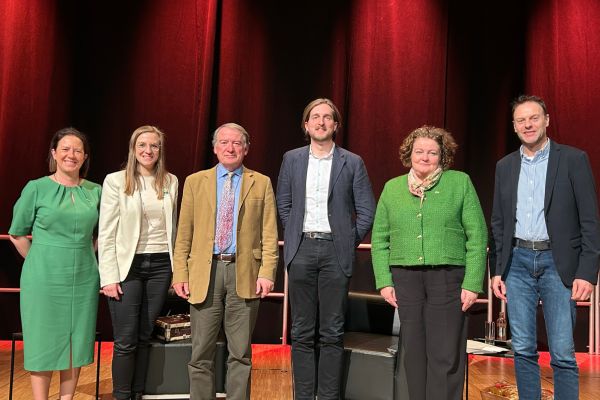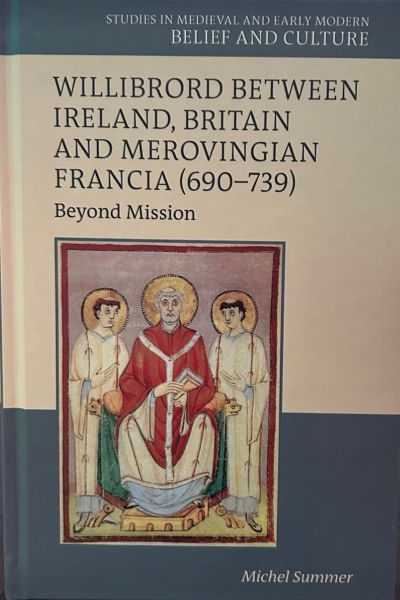 Credit: Helen O'Mahony/Chronicle.lu
Credit: Helen O'Mahony/Chronicle.lu
On Tuesday 19 November 2024, the municipality of Echternach, in collaboration with the Willibrordus-Bauveräin asbl and the Irish Embassy in Luxembourg, hosted a presentation of the book Missionary, Saint, Political Actor: Willibrord Between Ireland, Britain and Merovingian Francia (690-739), by Dr Michel Summer, in the Trifolion cultural centre.
The evening presentation was followed by a discussion between the author and Irish historian Prof. Emeritus Dáibhí Ó Cróinín from Galway.
St Willibrord is the patron saint of Luxembourg and has strong connections with Ireland. He was born in Northumbria, Britain in 658AD, before moving to the monastery of Rath Melsigi in Co. Carlow, Ireland in 678AD, where he was ordained. Twelve years later, he led a contingent of monks on a mission to Frisia (today’s Netherlands and north-western Germany). He subsequently founded a monastery in Echternach, where he is buried. Each year on Whit Tuesday, St Willibrord is celebrated at the Echternach Hopping Procession.
Echternach Mayor Carole Hartmann welcomed the guests, including the Irish Ambassador to Luxembourg, Jean McDonald, and the British Ambassador to Luxembourg, Fleur Thomas. She spoke of the close ties between Echternach and Ireland and described St Willibrord as their "shared ally".
Ambassador McDonald spoke of the importance of the work carried out by generations of scholars, and how the event honoured learning and knowledge. She expressed her delight at discovering the link between St Willibrord and Ireland, and at welcoming a delegation from County Carlow to Luxembourg recently. She mentioned looking forward to deepening the connection between the two countries, as they honour the past and the ties that bind them together.
Marc Diederich, President of Willibrordus-Bauveräin asbl, explained that the association's initial mission was to rebuild the Basilica of St Willibrord in Echternach, but now focuses on the veneration of St Willibrord and the annual hopping procession.
Dr Michel Summer then presented his book to the audience. He thanked the Luxembourg National Research Fund (FNR) for the financial support he received while completing his PhD in Medieval History from Trinity College Dublin.
Dr Summer spoke of the history of St Willibrord as he moved from Britain to Ireland and then to continental Europe in the late seventh and early eighth centuries. Very few people during this period are known to have careers connecting Ireland, Britain, Francia and Rome. He spoke at length on the historical significance of St Willibrord, describing the saint as an important figure in the "Carolingian Renaissance", which is associated with the revival of learning and ecclesiastical standards in the Frankish world. St Willibrord's role on the continent was discussed, with Dr Summer stating that he had tried "to think more strongly than before about the complexity, the contingency and also the fragility of Willibrord's position on the continent". He reported that Ireland's former President Dr Mary McAleese described St Willibrord as "Ireland’s first ambassador to Europe" and a "true European".
Dr Summer added that the study of medieval history is as relevant as the study of contemporary history in understanding modern society. He also spoke of the current threats to our cultural heritage and of how the advancement of Artificial Intelligence could challenge the critical understanding of history.
In the discussion that followed, Prof. Emeritus Dáibhí Ó Cróinín mentioned that Dr Summer's publication was the first book in English on St Willibrord since the 1960s. He described it as a landmark publication in the field of medieval studies. He praised Dr Summer's new approach to his research in which he did not just take all previous studies at face value but studied the actual manuscripts themselves. He stated that medieval historians knew of St Willibrord but despite there being quite an amount of material on the saint available, it was the author who researched and gathered that information together. He described the book as recalibrating how we look at Irish history and its relationship with the continent.
Prof. Ó Cróinín delved into the many historical aspects of the time and captivated the audience with his knowledge and passion for the era. He pronounced both Dr Summer and St Willibrord as honorary Irishmen.
The relationship between scholars trained in Ireland, who brought their talents to the continent, and the production of manuscripts, including those from the Echternach scriptorium some 300 years later was discussed, as well as the cultural importance of Echternach. One of the Echternach manuscripts is the oldest known to have an Irish language entry.
Prof. Ó Cróinín concluded by commending Dr Summer, who had reanalysed and reinterpreted the sources available to him, culminating in a book that looks at St Willibrord from a different point of view.
Following the book presentation, Chronicle.lu had the opportunity to speak with Prof. Ó Cróinín.
Chronicle.lu: When and where did you first meet Dr Michel Summer and were you involved at any stage of his PhD?
Prof. Ó Cróinín: I met Michel first when I was still teaching in the University in Galway & Michel's Doktorvater, Dr Immo Warntjes, asked me if I would travel up to Trinity College Dublin once a week to give a seminar/workshop to his Medieval History graduate students on Medieval Latin Palaeography (art of reading, deciphering and interpreting medieval manuscripts). I was delighted to do so and Michel was one of the very best of the students who took part in the seminars/workshops.
I had heard from Immo previously, however, about Michel. He was very excited to have a student of Michel's obvious abilities signed up to do a PhD with him, and particularly that Michel came to Dublin with an interest in Luxembourg history and in Echternach in particular. I know also that Michel was hugely popular with the other grad[uate] students during his stay in Dublin. That said, I didn't have an active involvement in the supervision of his PhD studies, but I was able to help him by gifting him some important German books on the subject that would otherwise have not been available in Ireland.
Chronicle.lu: You have previously published articles on St Willibrord. In your opinion what is the most interesting or surprising aspect of his connection between Ireland and Luxembourg?
Prof. Ó Cróinín: I think the most interesting and surprising thing about the connection between Willibrord/Echternach and Ireland is how it has been for so many years "hidden in plain sight". The early history of Willibrord's Irish monastery, Rath Melsigi, is very well documented, in particular by the prince of Medieval historians, the Venerable Bede of England. And yet very little has been written (even in English) about that connection with Ireland. It's only when there was renewed interest in Echternach and its early manuscripts (from the 1980s on) that attention was directed again to the historical background behind Willibrord's early career (especially his years in Ireland up to AD 690, when he went ultra mare in Francia). Since then, a lot of research has been published, by myself, for the most part, it must be said (in all modesty!), but Michel's book has brought that research to a new level.
Chronicle.lu: You had the opportunity during this visit to Luxembourg to view the medieval manuscript recently acquired by Luxembourg's National Library (BnL). In your opinion, how does it compare, or can it be compared, to the Book of Kells?
Prof. Ó Cróinín: The recent acquisition by the National Library in Luxembourg of the giant bible manuscript is of enormous importance. The fact that it was possible at all to acquire such a book, in such magnificent condition and with such a historic link to Echternach, is itself amazing, especially when the other three related manuscripts are in libraries in Spain, Sweden and Germany. Just as it is important to Irish people that the Book of Kells is now in Dublin, so it should be a source of great pride to the citizens of Luxembourg that this magnificent new bible codex, with its demonstrable links to Luxembourg and Echternach, should be back “home” again.
Chronicle.lu: You have retired from academia but your interest in medieval history is still very strong. Are you currently involved in any projects?
Prof. Ó Cróinín: Although I'm retired from the University in Galway since 2019, I'm still working on medieval Irish and European history. My current projects include work towards producing an edition of a 7th-c. Hiberno-Latin commentary on Genesis, and further research into the early history of Rath Melsigi and its links with Willibrord and the continent.









